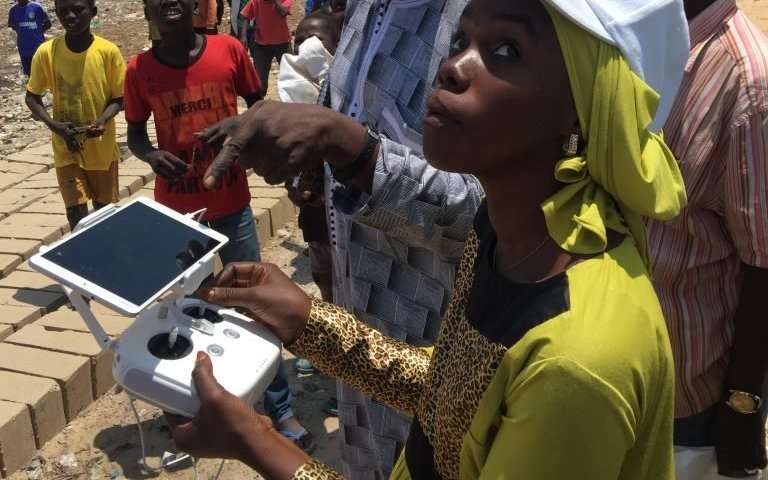Credit: WeRobotics
(Tech Xplore)—WeRobotics have a drone plan to drop sterilized male mosquitos, in an experiment focused on bringing down the mosquito population and in turn reducing the numbers of people who die from diseases they carry.
The drones can carry hundreds of thousands of mosquitoes, said the BBC. "Sterile male mosquitoes cannot produce offspring when they mate with females. By crowding out other males, they reduce the mosquito population," Chris Foxx, BBC technology reporter, said.
The World Health Organization (WHO) states that mosquitoes are one of the deadliest animals in the world. Their ability to carry and spread disease to humans causes millions of deaths every year.
Each year, said Evan Ackerman in IEEE Spectrum, mosquitoes infect about 700 million people with diseases such as malaria, dengue fever, West Nile virus, and Zika.
Sustained mosquito control efforts are important to prevent disease outbreaks, and WHO stresses that the elimination of mosquito breeding sites is the most effective intervention for protecting populations.
Why not just spray areas known to carry such risks? As for mosquitoes, "one of the biggest animal killers worldwide," Adam Klaptocz, WeRobotics co-founder, said methods to control their populations such as fumigation and insecticide have downsides. As quoted by the BBC, "Insecticide is not good for environment and needs to be constantly deployed."
Ackerman said government agencies and nonprofit organizations tried to prevent the spread of mosquito-borne diseases in developing countries by spraying large areas with insecticides for decades, but the process "is expensive, especially as mosquitoes develop resistance to commonly used chemicals."
The plan in more detail: WeRobotics has been developing the drones and will trial the idea next year. "The drones are still in development," said Foxx, but the company hoped to trial its technology with a focus on areas at risk from Zika virus first.
Ackerman said WeRobotics will conduct the first experiments for USAID with sterilized male mosquitoes in late 2017 or early 2018, somewhere in South or Central America.
Sterile insects released from backpacks carried by scientists presents difficulties to spread them over a wide area and they cannot simply be dumped in one location, said Foxx.
The BBC said WeRobotics was approached by international aid organizations for a solution.
Ackerman said both USAID and WeRobotics want to see if drones can replace conventional aircraft for managing mosquito populations over hundreds of square kilometers.
(Robert Malkin, an expert on new health-care technologies at Duke University, said it was not yet clear that drones will be much more effective than humans with backpacks at dispersing mosquitoes, according to Ackerman.)
Also, said IEEE Spectrum, "Keeping a million mosquitoes alive on board a drone isn't as easy as you think."
Packing hundreds of thousands of mosquitoes into a payload without damaging their thin legs and wings is a challenge.
"A mosquito that comes out of a drone damaged - or dead - is not going to mate with females," said Klaptocz in the report from the BBC.
Malek Murison reported on Wednesday in Internet of Business: "The first step toward ensuring the mosquitos aren't damaged in transit is to keep them sedated. To do that, they are kept inside pre-cooled container between 4 °C and 8 °C."
Foxx, BBC, said the container stage puts them in a sleep-like state that stops them moving around. The next challenge, he continued, is letting the insects out over a wide area "without waking the whole lot up at once." Their solution was a rotating platform with holes through which mosquitoes fall and land in a holding chamber. There they wake up, and fly out.
"After the mosquitoes have fallen through the rotating element, they spend a few seconds in a secondary chamber to acclimatize to the air outside before being dropped from the drone," said Murison.
"Our next step is running controlled tests, where we mark the insects, release them, and recapture them in traps to measure whether they're healthy or not," said Klaptocz in IEEE Spectrum.
Earlier this year, a Reuters report noted that public health experts said new players bring fresh thinking to vector control. The report quoted Anandasankar Ray, an associate professor of entomology at the University of California, Riverside: "It's exciting when technology companies come on board."
© 2017 Tech Xplore























